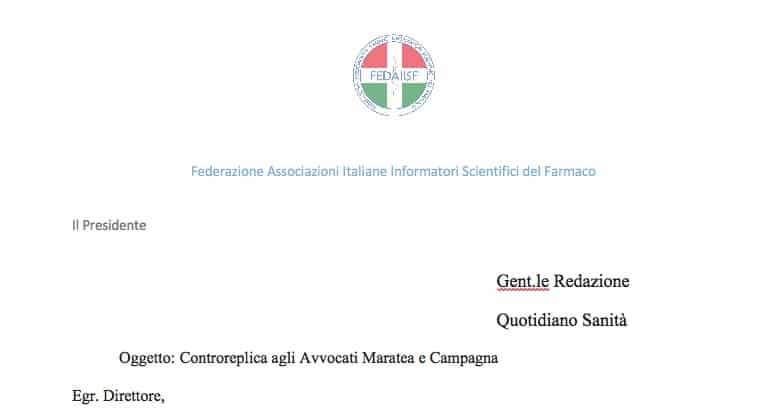Gli illustri avvocati Lorenzo Maratea e Maurizio Campagna replicano alla mia risposta,con un nuovo articolo si Quotidiano Sanità dal titolo “IScientific drug rep. Why it is important to 'hybridize' the figure“.
Secondly, they cite some court rulings, the position taken by the Supreme Court and two rulings by courts of merit, one in 1985 and one by the Court of Milan, 30 December 2015 which ruled on the independence of the whistleblower report.
The third quotation concerns the contractual practice in favor of an ISF-agent and an ISF-procurer.
Affermano inoltre che la mia posizione “it would be acceptable if the law clearly established the necessary subordinate nature of the ISF, if the contractual practice developed by the pharmaceutical companies were univocal and, lastly, if the jurisprudence were consolidated. Unfortunately, none of the three conditions is objectively present. From there a proposal, ours, which, like all proposals, does not aim to be the bearer of truth, but which certainly does not discount the limit of any mandatory rule“.
L’ISF ibrido “it would probably have the merit of better regulating the activity which in many cases is actually carried out by the ISFs by better reconciling the scientific vocation with the commercial aspect that is proper to propaganda, with positive effects also in terms of the certainty of the contributory obligation“.
Parlano al secondo punto di Cassazione (?), di una sentenza di un Tribunale di Firenze del 1985, quando non c’era neanche il D.Lgs. 541, e di un tribunale milanese del 2015, dimenticando di citare la Cassazione con la sentence 15 September 2014 n. 19394 in cui si dice testualmente che “the relationship of the person who mainly carries out the activity of medical-scientific informant rather than that of commercial agent must be traced back to the canons of subordinate work“. Nessun accenno ai Regolamenti Regionali che impediscono di fatto proprio l’attività commerciale degli ISF
Terzo punto: la prassi. Che avrà anche valore dove non c’è una legge di merito, ma se c’è una legge deve essere “secondo legge”, non against law Le prassi non costituiscono fonte di diritti e obblighi. Se la prassi è rubare nelle casse dello Stato, non è detto che sia ammissibile perché il “mariuolo” l’ha fatta franca.
The "ISF problem" is linked to an ethical question, questioned by the contractual aspect. Pharmaceutical companies produce and market a very delicate product, the drug, aimed at the citizen who uses it in a particular moment of his life, i.e. when he is not in health.
With Legislative Decree 219/2006, the legislator wanted to make the scientific representative responsible by recognizing in him the delicate role of linking pharmaceutical research and the doctor who will be able to choose the most useful drug for his patient with greater knowledge of the facts. Ultimately, the Scientific Representative helps to enforce the citizen's right to health enshrined in the ART. 32 of the Constitution.
If the ISF is managed commercially, and therefore paid as a percentage of the boxes sold, it has more interest in making sales volumes than in providing the doctor with correct information both on the beneficial effects and on the side effects of the relevant drug. Another very important aspect, and always underestimated, is pharmacovigilance. The ISF has the task, by law and together with the doctor, of collecting reports of adverse events of which it receives news both from the doctor and, accidentally, in the waiting rooms from patients. If the interest of this worker is to sell, why should he "risk" of casting a shadow on the validity of the product that allows him to support a family?
Bottom line, in our humble opinion, hybrid ISF not only makes no sense, but runs the risk of making it harmful to the community. While, again in our opinion, greater compliance with current legislation, assuming it is interpreted correctly, would allow the ISF to increase transparency in the health sector, obtaining another positive effect which is savings, as it would favor prescriptive appropriateness much sought after by health administrators.
However, we are pleased that today there is greater attention to the theme of "Scientific Information". It would have been more welcome years ago when it was decided, due to contingent needs, to include this professional figure in the CCNL in the field of marketing, creating the "practice" mentioned by the distinguished lawyers. But it's never too late to repair the damage done.
Foggia, 09/13/2019
Dr. Antonio Mazzarella
Quotidiano sanità – 16 settembre 2019

